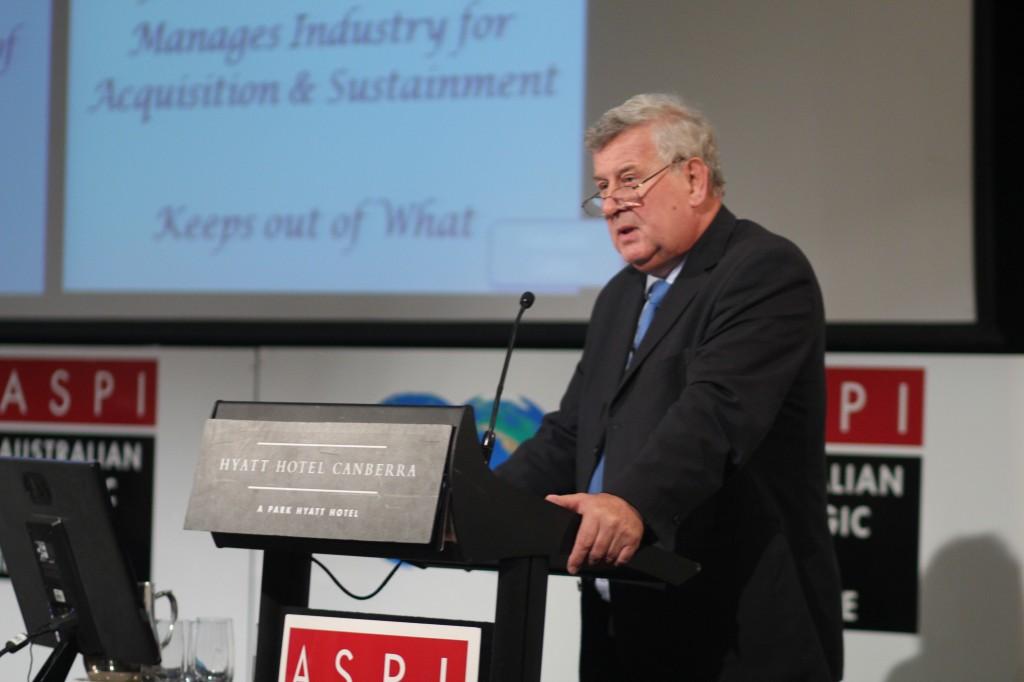Using Coles to make Defence more effective and efficient?
Posted By Peter Layton on April 16, 2014 @ 13:00
The successful 2012 Coles review could be noteworthy for more than just advising on submarine sustainment. It might also suggest a different model to consider for improving the effectiveness and efficiency of Defence.
Some will ask why bother? With promises of a 2% GDP defence budget, monetary pressures could be expected to gradually recede. But John Coles gave us something money couldn’t buy: his report made the submarine force more effective. There’s no reason to believe simply throwing more money at the force would’ve addressed its problems. As Coles reported, some 30% of the Navy’s sustainment budget was going into generating a steadily diminishing number of operational submarines. In late 2009, out of six submarines, only a single boat was usually available. Reinforcing failure by spending more would’ve been imprudent.
Coles found that the lack of online submarines wasn’t from lack of money but principally from internally-generated management difficulties. Coles’ worthy predecessor, the Rizzo review, had a similar finding about the amphibious ships. Coles, though, in following up his review in a just-released report has verified that the changes he recommended are actually delivering the desired outcomes. Hard data suggest he was right.
So the big lesson from Coles (and Rizzo) could be that the contemporary Defence organisation can’t reform itself through its normal internal processes. There might be many reasons why the organisation is unable to be self-critical: complacency, groupthink, a bias against innovation, confused lines of responsibility, an inability to hold anybody to account or simply a lack of internal devil’s advocates. The underlying reasons are less important than the success of the Coles model in cutting through the internally-generated bureaucratic and Service inertia.
Defence of course has had many reviews and reform programs. Indeed the submarine sustainment system that Coles improved was a product of more than two decades of well-intentioned reform programs. But many of those were high-level, cross-enterprise examinations that advocated general solutions for application across all parts of the organisation.
Such an approach may be well suited for uncomplicated, homogenous organisations but perhaps less so for complex, heterogeneous organisations like Defence. In the latter case, one-size-fits-all solutions might not work. . Compounding that problem, traditional, large-scale reform programs are deliberately long-running with outcomes both uncertain and distant. It seems people lose interest over time.
Coles offers a different approach to those enterprise-wide, broad-brush, managerially-based reviews and reform. His model suggests taking a technocratic approach, in which subject-matter experts examine the issues in depth within a strictly limited area of concern.
And the model might be particularly suited to issues of high political interest. In this case, intense ministerial interest helped motivate Defence to solve the problem and not simply to bury it. Indeed, there’s little to suggest Defence would’ve addressed this issue without direct ministerial intervention, just as the earlier problems with amphibious ships that Rizzo reviewed were seemingly overlooked. Both cases involved quantifiable problems that both ministers and taxpayers could see needed fixing and there was a set of metrics for measuring the success rate in addressing those problems.
But if Coles worked, why not simply repeat it using in-house staff? Consultants, so sceptics say, are simply people who borrow your watch to tell you the time. Defence has many smart people—surely they could do the same, or better? Well, Defence demonstrably can’t, or else they would’ve done it. Moreover, Defence doesn’t necessarily have a lot of spare subject-matter experts waiting around to undertake reviews. They all have day jobs. The ADF’s submariners are arguably some of the smartest people in Defence. If they found it impossible to address their own problems, it suggests insiders can’t.
Could the Australian National Audit Office (ANAO) undertake this function? The ANAO produces excellent reports that frequently delve into areas many departments wish they didn’t. However, ANAO staff are not subject-matter, technical experts in the esoteric disciplines found within Defence. Moreover, ANAO reports often focus on determining whether money was spent in the approved manner rather than whether it was well spent. Such reports highlight important issues but—again—if ANAO could do what Coles did they would surely have done it earlier.
The Coles model seems worthwhile instituting as a permanent series of continuous, rolling reviews into particularly worrying areas within Defence. But that would run the risk of diluting the impact of such enquiries and might simply become part of the landscape. Still. it doesn’t seem right to have to wait for major capabilities to fall over before getting serious, so a compromise needs to be found. One solution might be to extend the DMO gate review process into the post-delivery phase, with capability managers drawing on external expertise and, when necessary, commissioning out-sourced reviews which would aim at practical solutions to problems, with later follow-up studies to credibly verify if the reforms have worked. Even so, achieving success would need ministers to be interested and Defence to be motivated.
The impressive operational effectiveness gains and efficiency improvements the Coles review has brought are surely worth bringing to other areas of Defence.
Peter Layton is an independent researcher completing a PhD on grand strategy at UNSW. He has been an associate professor at the US National Defense University.
Article printed from The Strategist: https://aspistrategist.ru
URL to article: /using-coles-to-make-defence-more-effective-and-efficient/
URLs in this post:
[1] Image: https://aspistrategist.ru/wp-content/uploads/2014/04/Coles-at-SubCon.jpg
Click here to print.
